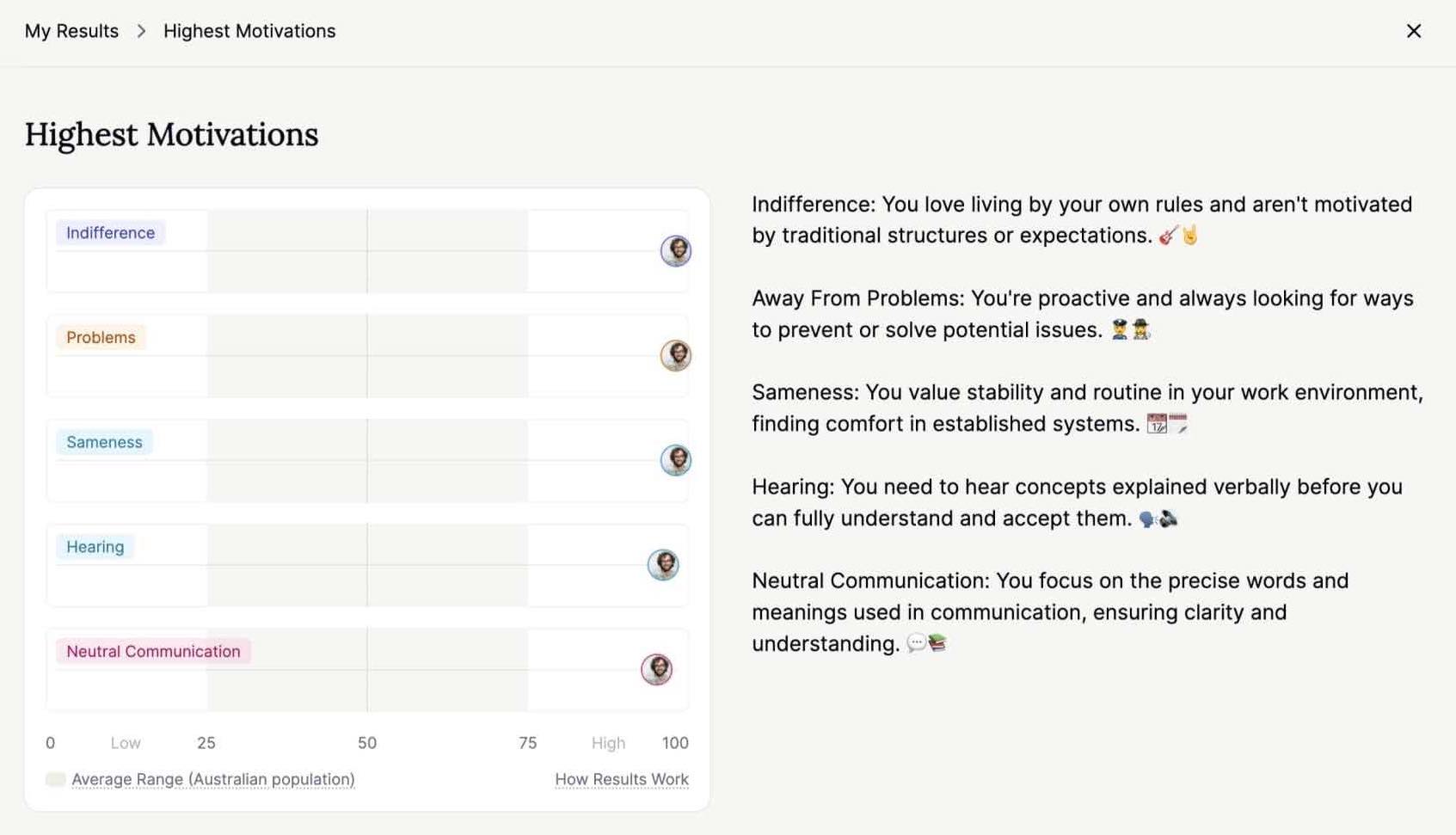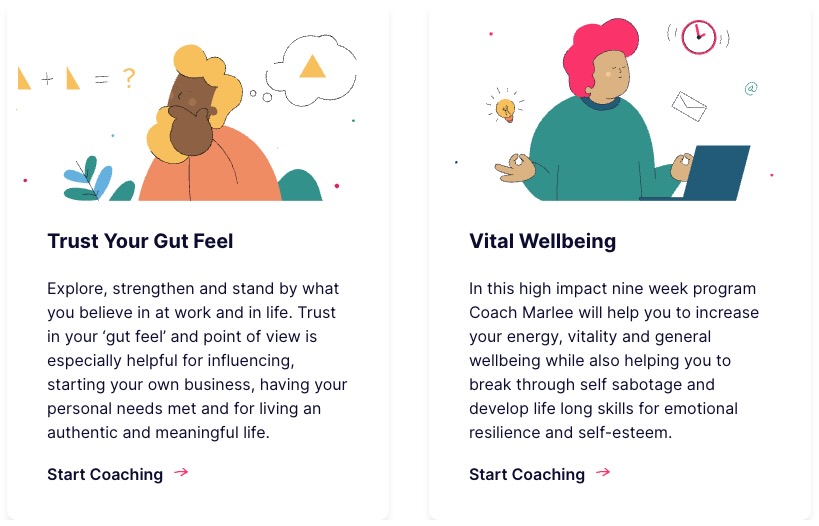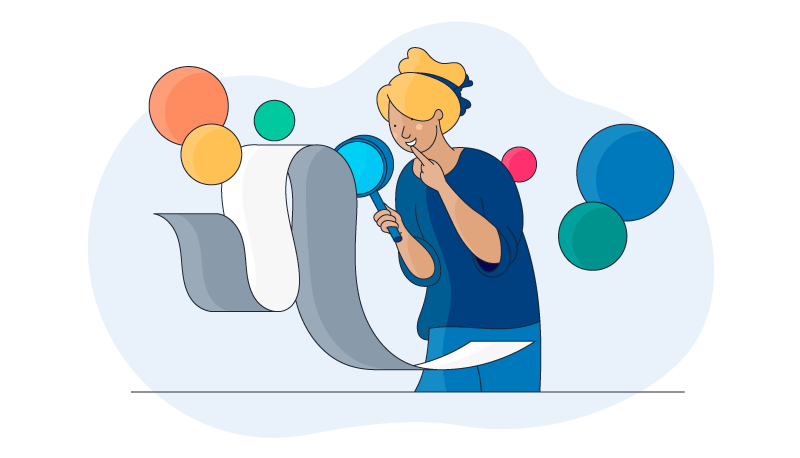12 Best mental health apps to support your well-being
Talking to a mental health professional face-to-face is often the best step for immediate support. But if you’re feeling off or overwhelmed, the right app can help. We reviewed 12 trusted options to guide you toward clarity, calm, and care.
- Author
Michael Metcalf

Not everyone feels ready to talk to a professional straight away. Whether you’re processing difficult thoughts or just trying to feel more like yourself again, a mental health app can offer a gentle first step—one that fits into your life, without pressure.
For therapists, these apps can also support ongoing care, offering patients small, practical tools between sessions to build mindfulness and emotional resilience.
With hundreds of options out there, it can be hard to know where to start. The best mental health apps don’t try to replace support—they help you build it. From guided exercises to daily reflections, they offer ways to track goal progress, stay grounded, and feel a little more in control each day.
We reviewed 12 of the most trusted options to help you find the right fit for your well-being.
Marlee
Free for individuals and small teams (up to 3 people)
Best for: increasing your energy, vitality, and general well-being
Marlee is an AI-powered online coaching platform developed by Michelle Duval, a pioneer in the coaching industry. Marlee was designed to support your well-being by helping you understand yourself better—what energizes you, what drains you, and how to build mental resilience in your daily life. Whether you’re feeling stuck, overwhelmed, or just want to get back on track, Marlee helps you take small, personalized steps toward growth, guided by a science-backed AI, Coach Marlee, who gets to know you.
At the heart of the experience is your Individual Results Board, a personalized map of your unique work style. From there, Coach Marlee recommends online coaching programs that help you to break through self-sabotage and develop lifelong skills for emotional resilience and self-esteem, so you can stay grounded before things spiral.

A Marlee Individual Results Board showing the highest motivations
Main features
- Personalized Individual Results board based on your unique work style
- AI-powered coach available 24/7 for personal growth and general well-being
- Personalized coaching, backed by science and motivation research
- Micro-coaching programs, such as Vital Well-Being, to increase your energy and vitality
- An Ask Marlee feature for real-time insights and everyday decision-making in the flow of work
- Motivational content and resources

Marlee's Vital Well-Being online coaching program
How does it work?
After a quick motivation assessment, you’ll unlock your Individual Results board—a visual breakdown of your motivational traits at work. Based on your results, Marlee guides you through short, personalized online coaching programs tailored to your goals, whether that’s reducing stress, building confidence, or improving emotional resilience.
Marlee is not a symptom-tracking app and isn’t designed for acute mental health conditions such as depression, anxiety episodes, or crisis support. If you're navigating those challenges, one of the other apps listed below may be more appropriate. Instead, Marlee focuses on self-development and prevention, helping you build inner strength before stress becomes burnout.
It’s a powerful tool to pair with therapy or use on its own—especially if you’re ready to take charge of your energy, mindset, and well-being at work and in life.
10% Happier
Limited free version; Premium from US$14.99/month
Best for: guided meditations, sleep support, and mindfulness for all levels
10% Happier is all about mindful meditation and personal growth. The app was brought to life by Dan Harris and Joseph Goldstein, drawing on the teachings from Dan's #1 New York Times bestseller and material from the Ten Percent podcast.
Main features
- Hundreds of high-quality meditations and lessons
- Topic-specific meditations
- The search function makes it easy to find courses quickly
- Introductory videos that help users practice
- Timed sleep meditations are included with the Premium plan
Although the 10% Happier app is easy to use, it's not meant just for beginners. There are more than 500 guided meditations available, able to cover any mood or goal for any experience level. You'll also find mindfulness exercises divided into topics for people dealing with anxiety, substance abuse/addiction, chronic pain, and depression.
10% Happier charges more than competitors, but it's packed with extra material, including the popular Ten Percent podcast and sleep exercises.
Calm
7-day free trial; plans from US$14.99/month or US$69.99/year
Best for: stress reduction, sleep support, and mindfulness
If you've been searching for a meditation app, chances are you've come across Calm. Developed back in 2012, Calm has accumulated over 100 million downloads on the App and Play stores.
Main features
- Free introductory 7-day program
- Helpful daily reminders
- Statistics and meditation tracking
- Tons of material, including stories and sleep exercises
- Family-friendly and "Calm Kids" content
Calm features an easy-to-use, kid-friendly interface that focuses on mindfulness-based stress reduction (MBSR).
Calm's guided meditation experiences are divided into different categories, such as beginners, work, inner peace, anxiety management, emotions, personal growth, and sleep. You can also take advantage of its daily 10-minute guided meditations, breathing exercises, sleep stories, and calming nature-inspired soundtracks.
What's Up?
Free for iOS and Android
Best for: tracking habits, managing negative thoughts, and daily mood support
What's Up? is a free mental health app developed by Jackson Tempra, designed to help users manage anxiety, depression, stress, and anger using techniques from Cognitive Behavioral Therapy (CBT) and Acceptance and Commitment Therapy (ACT). As a free app, it's not as extensive or personalized as some other options on this list, but it's still a great little tool you can use to track your mood and improve your mindset.
Main features
- Positive and negative habit tracker
- Comprehensive diary for your thoughts and feelings
- Grounding game with over 100 questions
- Positive quotes to keep you motivated
- Negative thinking pattern cheat sheet
What's Up's diary is easy to use, allowing you to rate your emotions on a scale from one to ten. The habit tracker is another core feature of the app, making it easy to track both good and set goals to end bad habits.
There are also three simple breathing exercises to keep you calm and relaxed, and when things get too much, the 'catastrophe scale' helps you put your problems into a better perspective.
MindShift CBT
Free for iOS and Android
Best for: managing anxiety, panic, and perfectionism with CBT-based tools
MindShift CBT is a free, evidence-based mental health app developed by Anxiety Canada, designed to help users manage anxiety through Cognitive Behavioral Therapy (CBT) strategies. It offers tools for relaxation, mindfulness, and cognitive restructuring, along with a community forum for peer support.
Main features
- CBT-Based Tools include exercises like belief experiments, fear ladders, and coping cards to challenge negative thought patterns
- Daily check-ins allow users to track their mood and anxiety levels over time
- Goal setting helps you set and monitor personal goals related to anxiety management
- Chill Zone offers guided meditations and relaxation exercises to help users manage stress and anxiety
- Community forum provides a platform for users to share experiences and offer peer support
Aside from all the tools and materials provided by MindShift, the app provides immediate stress relief through the quick relief mode. These tools are designed to help you control your breathing, ground yourself, shift your thinking, and take steps to cope.
There's also an active community forum where you can share stories and learn from others' experiences. Peer-to-peer support in a moderated environment where you feel safe can work wonders to lessen the severity of your symptoms.
BetterHelp
Free 7-day trial; subscriptions from US$60–$90/week
Best for: 24/7 access to licensed mental health professionals
Established in 2013 in California and now operating under Teladoc Health, BetterHelp aims to make mental health support more accessible and convenient.
Main features
- Offers easy access to traditional therapy
- 24/7 access to well-qualified therapists
- You can remain anonymous and/or choose to get help through live chat
- Supports a range of devices, including computers, smartphones, and tablets
- Free 7-day trial
Currently, there are more than 30,000 licensed therapists working on the platform, and you're automatically assigned one when you sign up for an account and complete the online questionnaire. When and how you communicate with your therapist is entirely up to you. You can choose to do your therapy sessions via video chat, phone call, live chat, or even messaging similar to email.
The platform also offers a range of tools such as journaling features, worksheets, and group webinars.
Sanvello
Self-care from US$8.99/month; coaching and therapy available
Best for: combining mindfulness tools, mood tracking, and virtual coaching to manage stress, anxiety, and depression
Sanvello is a mental health app designed to support you in managing stress, anxiety, and depression through evidence-based techniques. Formerly known as Pacifica, Sanvello integrates Cognitive Behavioral Therapy (CBT) tools, mindfulness practices, mood tracking, and community support into one platform.
Main features
- CBT and mindfulness meditation
- Guided meditations for all experience levels
- Many useful tools are available for free
- The coaching feature is budget-friendly
- Active community and peer-to-peer support
- Some insurances are accepted
If you'd rather not pay $80+ for online therapy sessions, you can always opt for the coaching service. It comes with everything included in the self-care package with the addition of personalized care by a trained coach. You can message your coach within the app at any time, but it takes about one business day to hear back from them.
Sanvello is extremely user-friendly, and everything you need to overcome mild mental health issues is available to you within the app.
Headspace
Free 7-day trial; plans from US$12.99/month
Best for: beginner-friendly meditations, sleep support, and family use
Headspace is a popular mental health app that's child-friendly and easy to use. Once you sign up for an account and watch the introductory video, you'll be able to toggle between four categories: meditate, sleep, move, and focus.
Main features
- Daily push reminders to help you stay on track
- Quick meditations
- Kid-friendly meditations
- Sleep exercises
- Motivation and support through the buddies feature
It's one of the few mental health apps that offers complete and easy-to-follow meditations for young kids. You'll find plenty of digestible lessons, breathing exercises, and relaxing mindful activities featuring many familiar faces from Sesame Street.
With its simple interface and easy-to-navigate menu, Headspace is a great choice if you're new to meditation and don't know where to start.
Happify
Free version available; Premium from US$14.99/month
Best for: gamified CBT, quick mood-boosting activities, and mindful habit building
Like many of the apps on this list, Happify is based on cognitive behavioral therapy and positive psychology. Initially, the app provides a quick assessment of your biggest strengths, recommending activities and exercises that best fit your profile.
Main features
- AI coach named Anna guides you through activities, offering support and personalized feedback
- Wide range of available courses
- Non-intimidating introduction to CBT
- Plenty of in-app games and activities available on the free version
- Activities and exercises include notes about the science behind them
- Quick 5-minute activities you can fit into your busy schedule
Happify is backed by research and is very transparent about its approach and methodology. Every activity recommended to you has a purpose, and it comes with a brief, easy-to-read explanation.
The racial injustice learning "Tracks" are a nice touch – racial discrimination isn't often given too much attention on other mindfulness apps.
With its gamified aspects and easy-to-follow "Tracks," Happify is especially good for people who are new to mindfulness and meditation.
Moodfit
Free version available; Premium from US$8.99/month
Best for: tracking mood patterns, habits, and health insights with CBT tools
Available for both Apple and Android, Moodfit is a mobile mental health app designed to help you improve your emotional well-being through evidence-based tools and personalized insights. Recognized as the “Best Overall Mental Health App” by Verywell Mind for multiple consecutive years, Moodfit offers plenty of mood-tracking tools, unique features, and hundreds of exercises. Whether you're just experiencing sudden mood swings or you're just looking for a quick mood boost, Moodfit has the tools you need to overcome negative thoughts.
Main features
- Daily goals and daily progress trackers
- Structured breathing exercises
- Personalized reports and charts to help you spot patterns
- Sleep, nutrition, and exercise tools
- Mental health assessments (e.g., PHQ-9, GAD-7)
Moodfit's introduction to CBT is ideal for beginners. The secret behind Moodfit's success is its ability to create a set of easy-to-track personalized goals. It helps you understand the correlation between your mood and other physical factors, improving your eating, sleep, and exercise habits as a result.
The custom activity tracking feature is a great way to keep tabs on variables that may affect your mood throughout the day, such as caffeine intake, hydration, and meals.
Talkspace
Plans from US$260/month; includes live sessions or messaging
Best for: flexible online therapy with licensed professionals and 24/7 messaging
Yes, Talkspace is expensive. Founded in 2012 by Oren and Roni Frank, Talkspace aims to make mental health support more accessible and convenient. Its cheapest monthly plan costs almost as much as two sessions with a certified psychologist.
Main features
- Diverse therapist network with access to a wide range of licensed therapists specializing in areas such as anxiety, depression, trauma, and relationship issues.
- 24/7 communication with your therapist
- Set number of live sessions/month based on your chosen plan
- Engage with therapists via text messaging, live chat, phone calls, or video sessions
- You can switch therapists or stop therapy whenever you want
That aside, Talkspace is a good alternative to in-person therapy as it provides each user access to an accredited, experienced licensed therapist. Once you've completed the intake form, you'll find yourself with several options, much like a matchmaking service for dating. You can view a therapist's profile and professional license number, as well as learn more about their experience, availability, approaches, and specializations.
Popular types of therapy offered by certified professionals on Talkspace include cognitive behavioral therapy, psychodynamic therapy, behavioral therapy, and humanistic therapy.
Shine
Free 7-day trial; Premium from US$14.99/month
Best for: inclusive self-care, audio meditations, and community support
Founded by Marah Lidey and Naomi Hirabayashi, Shine aims to make mental health care more inclusive and accessible, particularly for BIPOC communities. Shine is a robust and affordable self-care app featuring various tools, thousands of meditation sessions, and high-quality audio clips. It was featured as Best of 2020 by the App Store, and it won the 2019 Webby Award for Best Lifestyle App.
Main features
- Comprehensive library of more than 1,000 meditation sessions
- Push notifications and daily reminders
- Weekly courses centered around building life-long skills
- High-quality audio sessions
- Monthly virtual workshops with mental wellness experts
Shine is a very active app. Talks and seven-day challenges are updated weekly, keeping users interested and engaged for long periods of time with fresh content.
Aside from the usual mood-tracking tools and self-care challenges, Shine encourages communication with the discussion prompt feature, which allows users to share their worries and support each other in real-time.
Shine famously caters to traditionally underserved groups, with specialized content for women, LGBTQI, Black, Indigenous, and People of Color (BIPOC) communities. There's also updated content for anyone who needs help navigating COVID-19 and post-pandemic anxiety.
Mental health support on the go: which app is best for you?
The best mental healthcare app is the one that best serves your unique needs. If you're looking for a well-designed mood tracker and need access to some good meditation sessions, apps like 10% Happier, Calm, and What's Up will do the trick.
If you're looking for online therapy sessions with a mental health professional, an app that provides telehealth services (such as BetterHelp) will probably serve you best. If you've been diagnosed with a specific mental health condition, these will likely be the better option too (as long as you've already consulted a mental health care professional first).
In any case, you need to make sure the app you choose can deliver a personalized experience – there's no one-size-fits-all approach when it comes to mental health problems and solutions.
We think a combined approach is the best way to do it. Mental illness or mental health issues can be serious lifelong conditions, but they can also be temporary states of being that we treat like an injury or disease.
Just like your physical health, your mental well-being needs consistent care, not just when things feel off, but as part of your everyday rhythm. The most effective approach often combines tools: symptom-focused apps for immediate support, and development-focused programs that help you grow stronger over time.
👉 If you haven’t explored Marlee yet, our Vital Well-being program is a great place to start.
With Marlee, you’ll get a smart, science-backed AI coach who adapts to your unique work style, helps you track your progress, and gently guides you to build confidence, clarity, and emotional resilience, one small step at a time.
With the right support, it can become your greatest strength.


